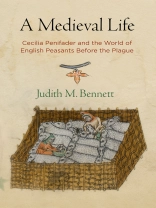A Medieval Life offers a biography of one woman, a portrait of her world, and an introduction to historical method.
A Medieval Life offers a biography of one woman, a portrait of her world, and an introduction to historical method. Written in a clear and accessible style, it reworks a well-loved book to provide an entirely new resource for students, teachers, and general readers.
Like Cecilia Penifader, most people in the Middle Ages were peasants, humble people living socially below the knights, bishops, and kings who figure so large in history books. Judith M. Bennett shows that peasants, too, made history. She explores how peasant lives were closely entangled with the lives and interests of those more privileged, looking at manors as well as villages; parishes, faith, and ritual practices; royal taxes and justice; economy and trade; famine and disease. By moving out from Cecilia’s perspective, the book explores the ties and tensions that bound all medieval people—poor as well as rich—into a medieval society.
The book also provides a primer on the fact-finding and interpretative debates that are at the heart of the historian’s craft. Each chapter includes a new section on how medievalists today are studying such topics as puberty, morals, courtship, and climate change. The illustrations, taken from the famous Luttrell Psalter, provide a coherent, rich, and interpretatively complex visual program. And the final chapter explores some of the different ways in which historians, for better and for worse, have understood medieval society.
O autorze
Judith M. Bennett is now retired from an award-winning teaching career at the University of North Carolina at Chapel Hill and the University of Southern California. She is the author of numerous books, including History Matters: Patriarchy and the Challenge of Feminism, and coeditor, with Amy Froide, of Singlewomen in the European Past, 1250-1800, both of which are available from the University of Pennsylvania Press.












